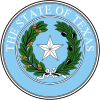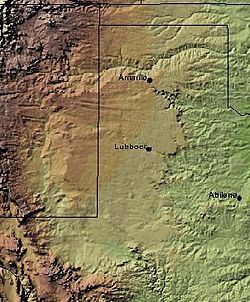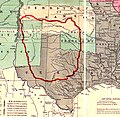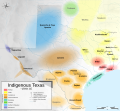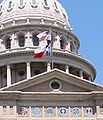Portal:Texas
The Texas Portal
Texas (/ˈtɛksəs/ TEK-səss, locally also /ˈtɛksɪz/ TEK-siz; Spanish: Texas or Tejas, pronounced [ˈtexas]) is the most populous state in the South Central region of the United States. It borders Louisiana to the east, Arkansas to the northeast, Oklahoma to the north, New Mexico to the west, and the Mexican states of Chihuahua, Coahuila, Nuevo León, and Tamaulipas to the south and southwest. Texas has a coastline on the Gulf of Mexico to the southeast. Covering 268,596 square miles (695,660 km2), and with over 30 million residents as of 2023, it is the second-largest U.S. state by both area and population. Texas is nicknamed the Lone Star State for its former status as an independent republic. The Lone Star can be found on the Texas state flag and the Texas state seal. Spain was the first European country to claim and control the area of Texas. Following a short-lived colony controlled by France, Mexico controlled the territory until 1836 when Texas won its independence, becoming the Republic of Texas. In 1845, Texas joined the United States as the 28th state. The state's annexation set off a chain of events that led to the Mexican–American War in 1846. Following victory by the United States, Texas remained a slave state until the American Civil War, when it declared its secession from the Union in early 1861 before officially joining the Confederate States of America on March 2. After the Civil War and the restoration of its representation in the federal government, Texas entered a long period of economic stagnation. Historically, four major industries shaped the Texas economy prior to World War II: cattle and bison, cotton, timber, and oil. Before and after the Civil War, the cattle industry—which Texas came to dominate—was a major economic driver and created the traditional image of the Texas cowboy. In the later 19th century, cotton and lumber grew to be major industries as the cattle industry became less lucrative. Ultimately, the discovery of major petroleum deposits (Spindletop in particular) initiated an economic boom that became the driving force behind the economy for much of the 20th century. Texas developed a diversified economy and high tech industry during the mid-20th century. , it has the most Fortune 500 company headquarters (53) in the United States. With a growing base of industry, the state leads in many industries, including tourism, agriculture, petrochemicals, energy, computers and electronics, aerospace, and biomedical sciences. Texas has led the U.S. in state export revenue since 2002 and has the second-highest gross state product. (Full article...) Selected article -Lesbian, gay, bisexual, and transgender (LGBT) people in Texas have some protections in state law but may face legal and social challenges not faced by others. Same-sex sexual activity was decriminalized in Texas in 2003 by the Lawrence v. Texas ruling. On June 26, 2015, the Supreme Court of the United States ruled bans on same-sex marriage to be unconstitutional in Obergefell v. Hodges. Texas has a hate crime statute that strengthens penalties for certain crimes motivated by a victim's sexual orientation, although crimes are rarely prosecuted under the statute. The law does not cover gender identity. While some localities in Texas have ordinances that provide a variety of legal protections and benefits to LGBT people, Texas has had no statewide law banning anti-LGBT discrimination. The federal protections against employment discrimination based on sexual orientation or gender identity, established in 2020 by several landmark cases, apply in Texas. (Full article...)Selected biography -David Koresh (/kəˈrɛʃ/; born Vernon Wayne Howell; August 17, 1959 – April 19, 1993) was an American cult leader who played a central role in the Waco siege of 1993. As the head of the Branch Davidians, a religious sect and offshoot of the Seventh-day Adventists, Koresh claimed to be its final prophet. His apocalyptic Biblical teachings, including interpretations of the Book of Revelation and the Seven Seals, attracted various followers. Coming from a dysfunctional background, Koresh was a member and later a leader of the Branch Davidians, a movement originally led by Benjamin Roden, based at the Mount Carmel Center outside Waco, Texas. There, Koresh competed for dominance with another leader, Benjamin Roden's son George, until Koresh and his followers took over Mount Carmel in 1987. In the early 1990s, he became subject to allegations about polygamy and child sexual abuse by former Branch Davidian associates. (Full article...)Texas news
Wikinews Texas portal
ListsState symbols
Texas topicsSelected imageCities -Abilene (/ˈæbɪliːn/ AB-i-leen) is a city in Taylor and Jones County, Texas, United States. Its population was 125,182 at the 2020 census. It is the principal city of the Abilene metropolitan statistical area, which had a population of 165,252 as of 2020. Abilene is home to three Christian universities: Abilene Christian University, McMurry University, and Hardin–Simmons University. It is the county seat of Taylor County. Dyess Air Force Base is located on the west side of the city. Abilene is located on Interstate 20. I-20 forms a rounded bypass loop along the northern side of the city, between exits 279 on its western edge and 292 on the east. The city is located 150 miles (240 km) west of Fort Worth. Multiple freeways form a loop surrounding the city's core: I-20 on the north, US 83/84/277 on the west, and Loop 322 to the east. The former Texas and Pacific Railway, now part of the Union Pacific mainline, divides the city into well-established north and south zones. The historic downtown area is on the north side of the railroad, while the growing South Of Downtown Abilene "SODA" district is located on the south side of the tracks. (Full article...)General imagesThe following are images from various Texas-related articles on Wikipedia.
CategoriesSelect [►] to view subcategories
Related pages
Attractions
 Things you can doAssociated WikimediaThe following Wikimedia Foundation sister projects provide more on this subject:
SourcesMore portals | ||||||||||||||||||||||||||||||||||||||||


